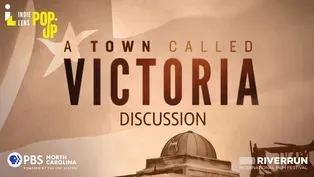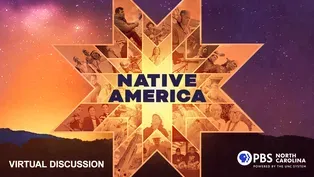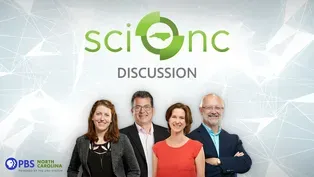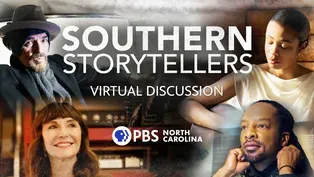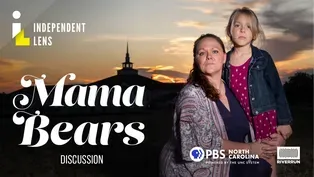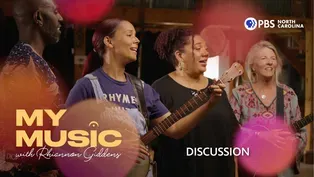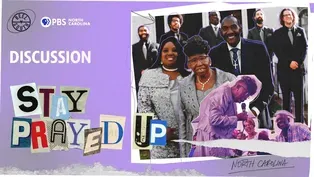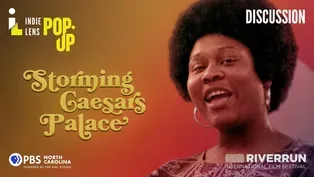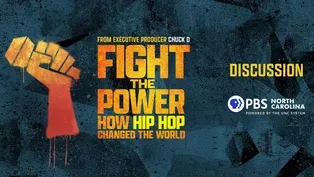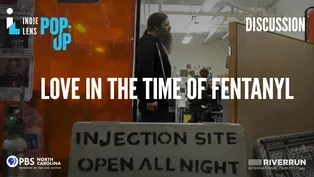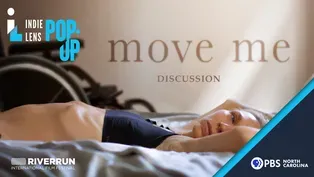PBS North Carolina Specials
In Conversation with Durham DA Satana Deberry
5/4/2021 | 43m 27sVideo has Closed Captions
Satana Deberry discusses her first two years as Durham District Attorney.
Black Issues Forum Producer/Host Deborah Holt Noel sits down with Durham DA Satana Deberry and Philadelphia DA Larry Krasner and asks tough questions about what it means to be a progressive prosecutor.
PBS North Carolina Specials
In Conversation with Durham DA Satana Deberry
5/4/2021 | 43m 27sVideo has Closed Captions
Black Issues Forum Producer/Host Deborah Holt Noel sits down with Durham DA Satana Deberry and Philadelphia DA Larry Krasner and asks tough questions about what it means to be a progressive prosecutor.
How to Watch PBS North Carolina Specials
PBS North Carolina Specials is available to stream on pbs.org and the free PBS App, available on iPhone, Apple TV, Android TV, Android smartphones, Amazon Fire TV, Amazon Fire Tablet, Roku, Samsung Smart TV, and Vizio.
Providing Support for PBS.org
Learn Moreabout PBS online sponsorshipMore from This Collection
Discussion - A Town Called Victoria - Independent Lens
Video has Closed Captions
The filmmaker and former Victoria residents share their story. (46m 51s)
Discussion - Native America Season 2
Video has Closed Captions
Panelists discuss preserving the languages of Native American tribes. (39m 1s)
Video has Closed Captions
Sci NC executive producer and host, Frank Graff, chats about upcoming Season 6 of Sci NC. (26m 6s)
Discussion - Southern Storytellers
Video has Closed Captions
Author David Joy and others discuss storytelling and their new PBS series. (42m 13s)
Discussion - Mama Bears | Independent Lens
Video has Closed Captions
Producer and director Daresha Kyi discusses the film and LGBTQIA+ advocacy. (34m 41s)
Discussion - My Music with Rhiannon Giddens
Video has Closed Captions
Discussing the series with producers Will & Deni McIntyre and country artist Rissi Palmer. (39m 56s)
Discussion - Free Chol Soo Lee | Independent Lens
Video has Closed Captions
Local lawyers, professors and nonprofit leaders discuss wrongful convictions and reentry. (40m 44s)
Discussion - Stay Prayed Up, Reel South
Video has Closed Captions
The filmmakers discuss their journey with Mother Perry and The Branchettes. (45m 4s)
Discussion - Storming Caesars Palace | Independent Lens
Video has Closed Captions
Local professors and nonprofit leaders discuss welfare and the social safety net. (33m 2s)
Discussion - Fight the Power: How Hip Hop Changed the World
Video has Closed Captions
Local experts discuss the history of hip hop with PBS North Carolina. (59m 43s)
Discussion - Love in the Time of Fentanyl | Independent Lens
Video has Closed Captions
Local harm reductionists, therapists and others discuss the opioid crisis and more. (55m 44s)
Discussion | Independent Lens: Move Me
Video has Closed Captions
A dancer with blindness and disability advocates discuss adaptable arts programs. (38m 46s)
Providing Support for PBS.org
Learn Moreabout PBS online sponsorship- Hello, everyone and thank you for joining us.
I'm Deborah Holt Noel of PBS North Carolina and I'm the Senior Producer of Black Issues Forum and host of North Carolina Weekend.
We're so glad that you decided to join us for this special conversation.
We proudly present content that connects us to our roots as North Carolinians, as Southerners and as Americans.
I'm proud to be with you tonight presenting and representing one of the nation's largest PBS affiliates.
The docu shot that you just watched features our very special guests this evening.
Durham's District Attorney, Satana Deberry.
You also saw an exclusive clip from episode eight of Independent Lenses eight part docu-series, Philly DA.
A little later on in the program you'll also get to meet the Philly DA himself, Larry Krasner.
We realized the impacts of the criminal justice system and police brutality can be traumatic.
We want this conversation and this forum to be a safe space to discuss the criminal justice system, prosecutorial reform and our community's vision for change.
We all have different experiences and different points of view.
So we ask that the virtual audience please be considerate when asking questions or making comments in the chat.
We may have different perspectives but we can all be civil and respectful.
On a lighter note, the filmmakers really love to hear comments and feedback from the audiences.
So please text your comments to the number that you saw on the screen and listed in the chat.
Text, phillync to 415-223-8013.
We encourage you to text once again phillync to 415-223-8013 throughout the discussion and after the event ends.
We will randomly select two people who participated in the survey to win a $50 gift card to a bookstore of your choice.
And your feedback once again is very invaluable and we appreciate your participation in the survey.
The number can also be found on the right hand side of your screen in the chat feature.
We want to hear from you and what is important to you.
So please enter your questions in the chat feature so DA Deberry can answer them.
And now I would like to start the conversation and introduce you to the Durham District Attorney Satana Deberry.
Welcome.
- Thank you.
- So excited to have you this evening.
We've already got lots of questions in the chat but I wanna start off with something that you mentioned in the docu shot.
You said that it is extremely important to protect defendant's rights.
And you said that to a woman who was clearly still dealing with some trauma from a personal incident, the loss of her own grandson.
Why is it so important that the defendant's rights be protected?
- Well, it's important because one, we don't ever wanna have to go through a prosecution again.
They are especially for serious and violent crimes they are traumatic for families and for the victims.
And every time they have to come to court every time there's a motion hearing, every time there's a trial, every time there's a verdict, there is...
It's a reminder of the very worst day of their life often.
And because the constitution really requires that I be the first person who defends a defendant's rights.
Because we want to hold people accountable.
We want to make sure we have the right person.
And to the extent that we can, we want to make sure that we can do some form of justice in the system.
- Another question that I think probably you get a lot is you know, just what does a district attorney do?
And you explained a little bit of that in the docu shot but I want you to talk about what it is that you do and what you want to do as an aggressive district attorney in the work toward criminal justice reform.
- Yeah.
So in North Carolina the district attorney has a hundred percent discretion in which cases make it to court.
So in North Carolina law enforcement charges which people are used to but they don't know that then the case goes to the prosecutor.
The prosecutor gets to decide whether to proceed with the case if there's enough evidence to proceed or if that community wants to see some different outcome.
And so what happens in the prosecutor's office is that we reevaluate every case that comes to us from law enforcement.
We make sure we have enough evidence.
We make sure that we can proceed on the case.
And if we can't proceed on the case we don't proceed on the case.
And I think what is really important as a progressive prosecutor is that we do take that time to evaluate every single case.
I think there are really two ways to do this job.
One way you can just take everything the law enforcement charges and move it forward and say we'll just let the system shake it out.
What things do we want to prosecute?
What things do we think are a result of poverty or substance abuse or mental illness?
And how can we then divert those people from court and only put into the court system the most serious and violent crimes.
- Talk a little bit more if you wouldn't mind about the criminal justice system working the way that it's supposed to in terms of holding accountable the most vulnerable communities and how that connects to race in communities.
- Sure.
We, it is... You often hear today people say that the system is broken.
As a progressive prosecutor I like to say that the system isn't broken.
It's working exactly as it should which is to really punish the people in our communities who have the least.
So we spent a lot of time on the really low level things that are easy to prove, that are easy to get poor people on, Black people other people of color and not as much time on the serious and violent things.
And so as a progressive prosecutor you wanna turn that on its head.
We wanna say in our community the things that keep us unsafe are serious and violent crimes.
But the members of our community who have substance abuse problems, who have mental illness who were just in the wrong place at the wrong time we don't wanna...
There are so many collateral consequences to prosecution and having a criminal record.
It makes it more difficult to get housing.
It makes it more difficult to get a job.
It makes it more difficult to go to school.
And so we don't wanna burden people when we don't have to.
So it's really important that we really sift through those things.
- And you talk about, you know, in terms of what I'm kind of hearing is funding.
Funding for different areas.
And it reminds me of the ongoing effort and a campaign that has a strange name, Defund the police.
There's an effort out there to reform criminal justice but then there's also this kind of campaign to redirect funds or defund police.
What are your thoughts about those efforts in that campaign?
- I think what we're hearing community members say is that they want to feel safe.
And if they don't sometimes they'll say with the police in their community I know many of us live in communities where if the police were driving through every hour on the hour we would not like that at all.
Right?
And there are lots of people in our community who do live in those types of communities.
And I think what they're saying is we want better policing.
If we're gonna have police, we want them to be able to tell, we want them to treat us like human beings.
Right?
When we call them we want them to come and not arrest us when we call.
When we will call them if we have a family member who's in crisis, we want them to show some compassion to that family member and not act like they're committing a crime.
And I think that is what this process really is about.
These community members taking back how they want to be policed and how they want to keep their community safe and really voicing that to their leadership.
- And you just kind of sticking with that a little bit you know, you've talked about making communities safer and of course everyone wants to live in a safe community and what kinds of crimes need to be targeted in order to make a community safer.
But then you also have this effort to make sure that there's fair policing so that people, specifically people of color, feel safe around policing.
What are your thoughts about where the focus and attention needs to be in order to make everyone safer?
- Well, I think we have a lot of things to focus on, right?
We have the root causes of crime which are communities where they're no jobs.
There's not adequate housing.
There's not adequate access to education.
And those communities are at risk of having more crime but they're not full of criminals, right?
There are people who grew up in those communities and thrive.
And they want to be seen as communities that have challenges, but need help.
And that they are taxpayers too, that they are community members too.
And so things that we call really kind of life style or life crimes, where people like things like trespassing or misdemeanor larceny, right?
When people shoplift.
Those types of little things are easy to prove and easy to over-police but they destabilize the community.
And they put law enforcement focused on those things as opposed to the things which you really know are random and can hurt people.
So things like shootings, right?
Things like armed robberies.
That while though they're rare have enormous impact on how safe people feel in their communities.
And so we really, in our office, we want to shift towards working on things like shootings, like homicides like armed robberies that really keep people unsafe.
- Now, one of the things that's kind of highlighted about Larry Krasner is that he like you is an aggressive DA working to reform criminal justice.
And you as an African-American woman, a district attorney are a rare bird in the world of district attorneys but you and other Black women who are DA's have been working to reform criminal justice for a long time.
Can you talk a little bit about your efforts even before perhaps Larry Krasner got in the game?
- Yeah.
Well, so I'm excited to have Larry on here tonight.
Larry is a friend of mine and Larry will be the first person to tell you that he learned from Kim Foxx who was elected a state's attorney in Chicago, in Cook County, Illinois.
People like Kim Foxx and Stephanie Morales Marilyn Mosby, the really the first progressive prosecutors elected in this country were Black women.
And that's important because there are 2200 elected prosecutors in the United States, less than 1% of them are Black women.
And it's important because you know the dirt I like to say the dirty little secret of a criminal justice system is that not only are all the defendants Black and Brown but all the victims are too.
And Black women are the people who are most likely to be victims of crime.
So we really have a really different experience of the criminal legal system.
We are the ones who if our partners are arrested or jailed, we're the ones who hold the house down.
We're the ones who are the grandmothers and the aunties and the cousins and sisters who make bail money.
We are the ones who welcome people back into our community and work with them to re-integrate themselves into our community.
And we are often increasingly defendants ourselves.
And so Black women I think have the most at stake for a fair and just system.
- Question from one of our participants.
And they're asking, "Can the Durham DA administer phase one of the move away from cash bail?
I heard that you mentioned cash bail a moment ago but wanted to know phase one of the move away from cash bail as enacted in Philadelphia DA.
Does this sort of enlightened the move to eliminate cash bail need state legislative action?"
- So we have already moved as much as we... We have already moved away from cash bail in Durham County.
As you know, in North Carolina judges set bail prosecutors don't.
But prosecutor has an oversized influence on what the judge knows about somebody that they're setting bail.
And so we have policies in my office in which we default to letting people sign themselves out if they have not committed a crime against another human being.
So if there's a human victim, there may be bail.
Otherwise we argue in my office, not for that bail.
And that has resulted in a tremendous decrease in the pretrial detention population at the Durham County Jail.
I believe the Durham County jail can hold as many as a thousand people.
Right now it has about 300 in it and that's a 20 to 40% drops since I took office.
And so we watch the jail population every day.
And we try to, for people who do not need to be detained we try not to detain them.
And do I think it needs a state legislation?
Absolutely.
I think that would...
The North Carolina constitution already default to not having cash bail.
And I think we would benefit from having some state legislation to really push that further.
- Thank you.
And here's another question from our chat.
It asks, "Do you have anyone on your staff who was formerly incarcerated?
How do you invest in these folks to lead the movement for change?"
- I... Not to my knowledge do I currently have anybody on my staff who was formally incarcerated?
I don't ask that question.
I have a fairly small staff and so but we are committed to hiring people from all walks of life in my office.
We pay attention to race, ethnicity, gender, sexual orientation, gender presentation.
None of those things would exclude.
Whether they have a criminal history or not wouldn't exclude somebody from working in my office.
- And it looks like we have another question.
It asks...
They want to know how can we justify life without possibility of parole for young persons, persons with mental illness, or for anyone with a potential for rehabilitation?
- I don't know that we can.
I think life without parole is... does not take into account the human capacity for change or for rehabilitation, or even for forgiveness from the families of that person's victim.
I think that is a conversation that we absolutely should be having in this country, not just here in North Carolina.
In many places, life even here in Durham life without parole is default rather than the death penalty.
So for those people who serve life without parole it is the de facto death sentence.
And I think we really should have some honest conversations about why that is our law and whether we are actually trying to find the truth in our criminal legal system or just punish people forever.
- Well, here's a question that is also from our chat and I want to tie it to something that I think you mentioned in the docu shot.
It asks, you know, beyond voting what can citizens of Durham do to support progressive criminal justice policies and community-based interventions?
And I recall that in Oakland homicides went down.
So, you know, in answering this question are there perhaps strategies that were used in Oakland that could also be replicated in cities in North Carolina?
- I'm not sure what happened in Oakland but I do know that one of the hardest things about prosecuting and solving homicide cases to start with for law enforcement and for prosecuting them is we need people to say they saw it, right?
We need our community members to step up and feel safe.
And they won't feel safe until they feel safe with law enforcement and they feel safe with their prosecutor's office.
And that's really by being open and transparent and talking about the work we do.
What we're trying to do is make community members feel safer and wanna talk to us and feel like if they tell us what they've seen if they know what's happened and they come forward that they can remain safe in their community that there won't be retribution and that we can help them move past that trauma as well.
So I would say the number one thing to do is to become involved in your community.
And if you see something, you know, please if you're asked, talk about it - That involvement and that communication are key it sounds like.
Right now I'd like to introduce another very special guest who has joined us the Philly DA himself District Attorney, Larry Krasner.
Larry, welcome.
- Well, thank you for having me.
It's always a good day when I get to get to be on with Satana.
- Wow, you look just like you do in the documentary.
[Deborah laughing] - I don't know if that's good or bad, but I'll go with it.
- How are things going in Philadelphia?
- You know they are exciting.
I won't get into detail but I happen to be in the middle of a reelection campaign.
And so it's busy times and you know there's a lot of revisiting some of the fundamental ideas that were sort of the basis of what we tried to do in Philly and what Satana has done so well in Durham.
- What are some of the reforms that have actually worked that you worked on that came to fruition?
- Well, I can tell you that, you know, I'm not sure what episodes your viewers have seen yet but there is one episode in which we talk about an early policy, which was to take about 25 low-level offenses and not seek any money as bail.
Very different from prior administrations.
And it was really just a net that kept poor people in jail for non-serious stuff.
That policy was a great success.
It reduced our jail population and it ended up not causing any additional crime and also not causing people to fail to show up for court.
That is validated by outside academics but also by data work that was done in our office.
So that is one of them.
In general, over the space that is the period of time that is covered by the docu-series and more recently we've seen very significant reductions in mass incarceration.
Right now we're up to about a 50% reduction in future years of jail, which is a tremendous change.
Over three years, we've seen a reduction in excess of supervision on probation and parole, future years of probation and parole that's almost two thirds.
We have our 20th exoneration today.
You know, innocent people shouldn't be in jail.
And not only should we make sure that's true moving forward but if we're gonna restore trust as Satana just spoke about, if we're gonna have witnesses willing to come forward, they gotta think that their prosecutors and their police officers are people they can trust.
So it makes a tremendous difference in the lives of those individuals but also symbolically where there is such a division.
- I'd like to ask both of you.
What's next on your reform agenda?
Satana, let me start with you.
- Well, we have been like Larry we've been working to do to resentence successively sentenced defendants.
We have focused on mass supervision as well.
I think today there are fewer than a thousand people in Durham County on probation or parole which is a tremendous decrease from 2018 when I was elected.
We are, as we move forward I think we're gonna be focused on now the harder things which are things like life without parole and really trying to decrease the amount of time that it takes us to prosecute the most serious crimes.
I think now it takes about 500 days on average to prosecute a homicide case.
That's 500 days that a defendant is waiting for their time in court, but also 500 days that a family has to go without accountability.
And so we are really working to have a system that moves more quickly for both victims and defendants and is focused on the right things.
- And how about you Larry, what's next on the reform agenda?
- You know, it's a little pie in the sky but I'll just say it anyway.
What I would really love to see is reinvestment.
I mean, the fact is when you do the kind of things that Satana is doing in terms of cutting way down the number of people on supervision, it saves a of money.
When you reduce future years of incarceration by 10,000 years, and we've done more than that.
But 10,000 years, times $50,000 a year you are talking $500 million in a school system in Philadelphia that only graduates about half the students which is chronically underfunded, far less funded than all of these beautiful suburban schools right over the line.
Right?
What we need to do is not just keep saving money so we can end up with $10,000 tax breaks for young homeowners.
We need to make sure that the money that is saved in this reform actually goes into the things that prevent crime.
And that of course is public schools.
It's treatment, it's economic opportunity it's job training.
You know, it's a $15 minimum wage.
It can be all these different things but we have to do that.
Or otherwise what's going to happen is, you know Satana is gonna make tremendous progress.
We're gonna make some progress in Philly and then all that money is going to get hijacked.
And it's gonna go for things like, you know cutting the taxes of wealthy people.
That's not what we need.
We need to build back our infrastructure.
We need to build prevention.
And that requires using resources wisely by reinvestment.
- A question is in our chat about the support that you're receiving from law enforcement and Satana I wanna ask this question to you first.
Do you get support from law enforcement in your progressive agenda?
So Durham has been I think, been one of the more progressive communities in North Carolina on criminal legal reform.
And I think that the city and County leadership got there before the district attorney's office got there.
Our most recent police chief moved us far down the road towards a more progressive policing policy.
There's a lot of activism now in Durham around where we wanna go next with law enforcement.
We have an opportunity to pick a new chief.
And I think all of those progressive reforms are gonna be on the table and are gonna be the type of things that we ask moving forward from our law enforcement leadership.
And so I think we are in a good place here in Durham.
We could do better always but I think we're moving in the right direction.
- And how about in Philadelphia?
- So I am not gonna start getting along with the head of our fraternal order of police anytime soon.
But I say that for a reason.
A lot of people think that, you know, the big mouth who's running the local police union actually runs a police department.
Oh no, indeed.
Most of them haven't seen a police car in 20 years.
There is such a huge difference between the very conservative often racist leadership of the police unions and the active officers.
And that is because in most cities, the large majority of the members of the union are actually retired, right?
So we have 6,500 active officers in Philly.
We got 20,000 members of the union.
The leadership of the union is 100% Republican.
It is 100% white.
It is a hundred percent male, it always has been.
It has endorsed Donald Trump twice.
And the leader himself at a press conference referred to Black Lives Matter as quote a pack of rabbit animals unquote.
He drinks beers with Proud Boys and defends officers who have visible Nazi tattoos.
I'm not making that stuff up.
On the other hand, our police department is actually headed by an African-American woman named Commissioner Danielle Outlaw who has a very different agenda and a very different approach.
You know, I expect to be endorsed by the Black Officers Association while the head of the FOP is spending every minute of every day trying to make sure I'm knocked out of the way because I hold police accountable.
So it's very important that we don't confuse these two entities.
I feel like I have a pretty positive relationship with an awful lot of the active officers even though we are holding them accountable and with the administration of the police department but it would be immoral for me to have , you know a good relationship with a blatantly racist, essentially pro-fascist leader of the police union who literally was drinking with the Proud Boys in FOP hall some couple of months before the insurrection.
- Hmm.
You know we're beginning to talk about the role of race and Satana I want to ask you, it seems as though I look around we look around and we see a lot of African-Americans in positions of leadership.
They're police chiefs.
They're like yourself the DA, they're the Sheriff.
They're... We have the elected officials.
And it just seems as though, especially when we look at policing and over aggression with Black and Brown communities that it's not really making an impact.
Can you share how much authority and power the people in those positions really have in the grand scheme of things?
- Sure.
That's a great question.
So Larry is talking about an individual racist person.
Right?
Outside influence.
But it's really important that we think about and we call this system what it is.
It is racism is a feature not a bug of the criminal legal system.
It was created for the most part to control them lives and movement of Negro people.
And it still does that.
And what that means is that it doesn't necessarily...
It makes a difference sometime who's in the seat.
But here I sit here in Durham which is at 80 years of black political power.
Like you said, I'm Black, our police chief, our sheriff our senior resident superior court judge, our chief district court judge.
There are, if you walk into a courtroom in Durham County most of the people in authority will be Black but also so are all under defendants.
And that is because the system itself is created to really focus on the people who were the poorest in our country and that's Black and Brown people.
And until we call the system what it is and provide like Larry said, these opportunities for education and work and ways to move out of poverty, we're gonna continue to see this kind of systemic system focused on the people who have the least in our community.
- I think it's so key what you said about making that distinction between racist individuals and the racist system.
And Larry, I'd love to get your input on this as well.
And your take on, you know, what do we mean by a racist system or racism or systemic racism?
- You know, I could not agree more with what Satana is saying.
Think about it from the very beginning.
All right.
So we have criminal laws.
The criminal laws in Pennsylvania have increased by 500% in the last 30 years.
What are you criminalizing?
What do you value?
You know, this is something Paul Butler writes about.
It's not the greatest example but white people commit suicide a lot.
They commit suicide at a high rate.
Guess what we don't criminalize?
Trying to commit suicide.
We'd all decided that was an advance.
Meanwhile, African-Americans have a higher rate of shooting each other.
Guess what we criminalized?
You know, we do this in many ways across the board.
People engaging in massive tax fraud are likely to be white.
And we say, "Oh, just by color fence.
Not that big a deal."
Not that big a deal?
I mean, it devastates society in all kinds of important ways that are arguably more important than a single robbery where no one gets hurt, right?
We have defined the laws in ways that are racist.
We then enforce the laws in ways that are very selective.
You know, if you look at what happened to Philando Castile, the man who was shot to death in his vehicle in the Twin Cities a few years before what happened to George Floyd.
This is a cafeteria worker who had been stopped driving his car.
It was like 50 or 54 times.
It was a worker with a permit to carry a firearm who was stopped in his car, 50 or 54 times.
I don't get stopped 50 or 54 times.
That's not gonna happen to me.
So the enforcement mechanism is also racist.
And then when you start looking at things like sentencing guidelines, mandatory sentences what you quickly find is that in many states a lot of legislators from rural areas which are whiter benefit financially from having prisons and jails in their jurisdictions.
And so they're very supportive of mandatory sentencing, high sentencing.
They are in fact, mining the bodies of people from the large urban centers which in many locations are Black and Brown to go into their jurisdictions because they make money off of it.
Because they get power off of it.
In terms of gerrymandering and in terms of how they are rewarded things like highway funds, right?
If you start to really look at it, it becomes a whole lot of episodes of 'The Wire' where you realize that that has so many different levels this is done.
Then look at how the media treats it, look at how the media has historically treated this.
Using one mugshot after another, you know, and almost invariably they would rather use a black person's mugshot than use a white person mugshot.
It is truly systemic.
It is truly sweeping.
- Well, it's just amazing that you made that reference because I was gonna take it to a new direction and maybe lighten things up a little bit by asking about the role of media and what maybe television police dramas out there are true to life or not true to life really kind of make your job more difficult.
Satana what do you think?
- So I used to be a fan of police procedurals until I was a prosecutor.
I mean, you know, most Americans will have no interaction with the criminal legal system.
They don't come down to the courthouse except maybe for traffic tickets.
But every American watches Law and Order or CSI or NCIS It has... One of those shows is their favorite show of all time.
And in those shows the only thing that happens is murder, rape and robbery, right?
Or big huge drug trafficking rings that are violent and shooting people in the streets and that's how they think is what's happening at the courthouse when the vast majority of what is happening at the courthouse are traffic tickets and profiling and charging and conviction of poor people for low level offence.
And so it really makes Americans think they live in an unsafer environment than they do.
Now, that's not to say that we do not have violent crime.
We absolutely do.
And, but like Larry said the things that cost our society hundreds of millions of dollars every day are not the things that we're focused on.
And I would say that one of the things that cost us hundreds of millions of dollars a day is the incarceration of all these human potential.
You know, I just listened to on Saturday to a man serving life in prison in New York and he writes for the New York Times and has written for several national publications and has now been serving 20 years.
And just the way just to think of the waste of his human potential and who he could be on the outside is tremendous.
- Well, Larry any television programs out there that have made your work particularly more difficult?
- Well, I mean I think in many ways it's both in entertainment and in news and this is really not a reflection of PBS compared to so many other stations.
PBS has been pretty wonderful.
But you know there is a reason why for 30 years crime has gone down year after year and 65% of the United States population has consistently believed crime was going up.
There has been a peddling of fear for a very very long time.
It's exactly what Satana is talking about.
You walk into a courthouse 70, 80, 85% of these cases are misdemeanor cases.
They're minor cases.
And what's going on there has a lot to do with the state collecting fees, collecting money.
This ridiculous notion that if you're involved with turnstile jumping the next thing you're gonna do is stranger rape or something like that.
But, you know, when we skew the image so we think that every defendant is Charles Manson.
Every defendant is, you know, Ted Bundy or something like that.
When we skew the image people believe that they're in danger all the time and what do they do?
They run out and buy guns.
I mean, think about the sweeping effect of convincing an entire population in a democracy that they're in grave danger.
And so what do they do?
So they elect prosecutors who promise to lock everybody up forever.
So they all run out and buy guns thereby endangering the society far more than they improve it.
You know, I guess that's sort of like a sweeping view of it.
The little view of what would be.
I know a lot of trial lawyers who are prosecutors who are not in love with all of the forensic shows because you know, they try a case they got solid evidence and the jury says, "Well, you know I didn't see the three way triangulated upside down woopty woop that I saw on this TV show?
It turns out it's fictional or almost non-existent but there's a reasonable doubt 'cause I didn't see the three-way triangulated upside down woopty woop you know, that sort of thing.
So... - It reminds me of how on all these shows they always have a bank of computers.
You know, on the first day I walked into my office my computer was running like windows 2000.
[Deborah laughing] - Sad as it is so.
We need to find additional funding additional funding for policing.
Before we wrap with final comments, I do wanna get a question out from our chat one to you Larry and one to you Satana.
Larry, the question is, in episode one Philly DA you and your team decided not to arrest sex workers.
How's that working out?
- Well, in my opinion it's working out well.
It is a phase one.
But obviously phase two is a public health solution coming from city that is of the strange opinion that you only help people by convicting them first.
You know one of the crucial flaws in our criminal justice system.
You know, I would say in general, I think most of Philadelphia supports that.
It, you know, can be difficult on a particular block at a particular time but in general I think it's going pretty well.
- Very good.
And Satana, here's a question for you.
I understand North Carolina has mandatory sentencing legislated.
Does mandatory sentencing preclude any consideration of the individual, any hope for reform and probation.
Also what can be done to abolish the death penalty.
So that's a whole lot for you to and address in 60 seconds but may be... - I think the short answer is North Carolina doesn't have mandatory sentencing.
It has something called structured sentencing which means that the judge, you know it's based on somebody's previous criminal record and the severity of their crime.
Which is why it's really important who the district attorney is.
And who's deciding what that person eventually gets charged with and pleads guilty to or is tried on.
Because where you land in whole structured sentencing boxes makes a huge difference for sentencing purposes and really for the rest of your life.
And what can we do to abolish the death penalty?
You know, my answer is to elect different people to the general assembly.
Elect people who want to abolish the death penalty.
That's the answer.
- Well, there it is.
And let me get your final thoughts before we wrap District Attorney Larry Krasner.
- You know, it is really wonderful being a part of what I see as civil rights movement of our time even though our role is really as technicians more than anything else.
And this is a grassroots movement.
Having a part in it is a lot better being part of history than watching it go by.
I'll say that.
So it's an honor to have the opportunity and I hope that some benefit comes out of this docu series because people should realize that you know you really don't have to be all that special to be a part of something that is special.
- Well, I've already learned a lot.
Satana, what would you like to leave with everyone?
- I think I said this in the documentary but, you know, this is the hardest job I've ever had but it's also the best job I've ever had.
It's an honor for me to work for the people of Durham County.
And I wanna remind people that we are the change that we've been looking for.
So get out there, you know, run for something.
If you want change, be that change.
- Well District Attorney of Durham, Satana Deberry, Philly DA, Larry Krasner Thank you both for enlightening us and for this great discussion.
Appreciate your time.
- Thank you.
- Thank you.
- I'd like to thank District Attorney Satana Deberry of Durham and also Larry Krasner, the Philly DA for joining us.
We really appreciate their time and look forward to the wonderful changes and the very real differences that they are making in communities.
Folks, please text phillync to 415-223-8013 to participate in an audience feedback survey and be eligible to win one of two $50 gift certificates to a bookstore of your choice.
Thank you audience for joining us and a very special thank you to ITVS for grant support for making this event possible.
And thank you to our event partners the State Library of North Carolina and River Run International Film Festival.
Don't forget to watch Philly DA episodes four through eight on Tuesdays at 9:00 PM from May 4th through June 1st on PBS NC or your local PBS station.
To watch episodes one through three stream at video.pbsnc.org or you can find it on the PBS app.
And please be on the lookout for an email early next week with a link for a recording of this discussion, additional resources and the texting survey information along with upcoming event information.
We and especially the filmmakers appreciate your participation, your comments, and your feedback.
And I'd like to remind everyone to tune in to Black Issues Forum every Friday night at 7:00 PM and also watch North Carolina Weekend on Thursday nights at nine.
For PBS North Carolina, I'm Deborah Holt Noel.
Thanks for watching.
Be safe and good night.
